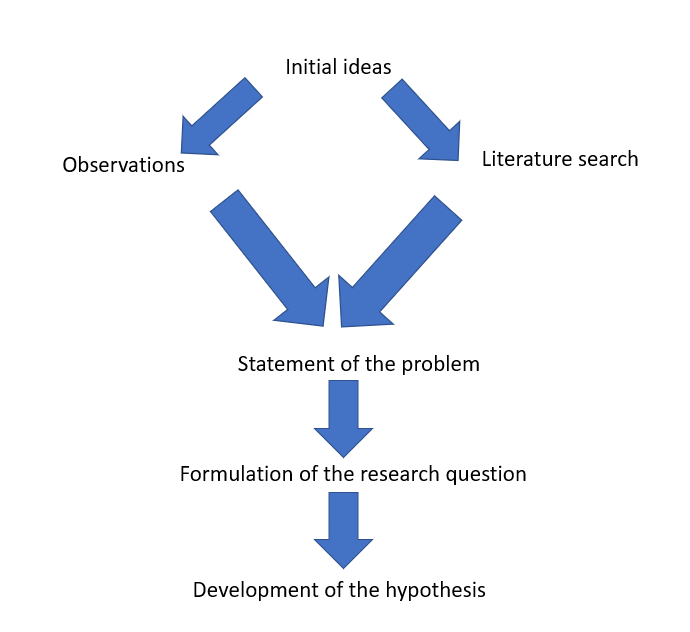Developing and writing a Research Hypothesis
A hypothesis (plural: hypotheses) is a statement of a prediction about the outcome of a study. In a hypothesis, a tentative relationship is stated between the independent variable (IV) and the dependent variable (DV), along with a prediction of the outcome. It is based on the existing body of knowledge in an area of study and is developed before the data are collected.
Note that some research, however, does not lend itself to hypotheses, e.g. exploratory research into a completely new topic about which limited information is available.
Developing a hypothesis
A hypothesis originates from pre-existing theories, previous research and commonly held beliefs. The scientific method usually begins with the formulation of a research problem and a research question. This is followed by background research (through a literature review). The information gathered sets the stage for drawing up a hypothesis. Data are then collected, analysed and interpreted to support or negate the hypothesis.

Difference between a hypothesis and research question
A research question addresses a research problem, which might be a challenge, doubt, gap or area of concern that warrants investigation. A research question gives your research a clear direction and helps you focus on key issues that need to be solved.
A hypothesis can be considered a translation of a research question into a prediction. Often, the question on its own is not enough to outline the experiments needed to answer it. Therefore, a hypothesis, or the best educated guess to the answer to the question, is generated. The difference between the two will be illustrated in the next section.
Steps to develop and write a hypothesis
1. Collect as much literature about a topic or problem as you can.
2. Examine the literature and identify possible causes of the problem or knowledge gaps to be filled.
3. Begin with a specific research problem. For example…
The association of the intake of fish oil has been studied in relation with heart and brain health in adults. Further, fish oil has been found to strengthen immune responses. However, its effect on immunity in children remains unknown.
4. Identify the variables. In the example above, the variables are:
- IV: Fish oil intake
- DV: Immunity in children
5. Formulate the research question. For example:
What are the effects of fish oil capsules on the immunity to influenza in children?
6. Write your hypothesis as a testable statement about the possible outcomes of the study: For example…
We hypothesise that the daily intake of fish oil capsules increases immunity to influenza in children.
Null hypotheses
A null hypothesis is a hypothesis that you may want to disprove. The above hypothesis can be converted to a null hypothesis as follows:
We hypothesise that the daily intake of fish oil capsules has no effect on immunity to influenza in children.
Hypotheses and conclusions
When writing the conclusion for your research, you will state whether the hypothesis was correct or not, followed by an explanation of the results of the research. Remember that a hypothesis does not have to be correct. The objective is to determine whether your prediction was right or wrong. The negation of a hypothesis is an important finding too!
Summary
Ensure the following aspects for your hypothesis:
- The hypothesis must be clear and directional.
- The hypothesis must be falsifiable (can be supported or refuted) and testable.
- The results of the hypothesis must be reproducible.
Maximise your publication success with Charlesworth Author Services.
Charlesworth Author Services, a trusted brand supporting the world’s leading academic publishers, institutions and authors since 1928.
To know more about our services, visit: Our Services